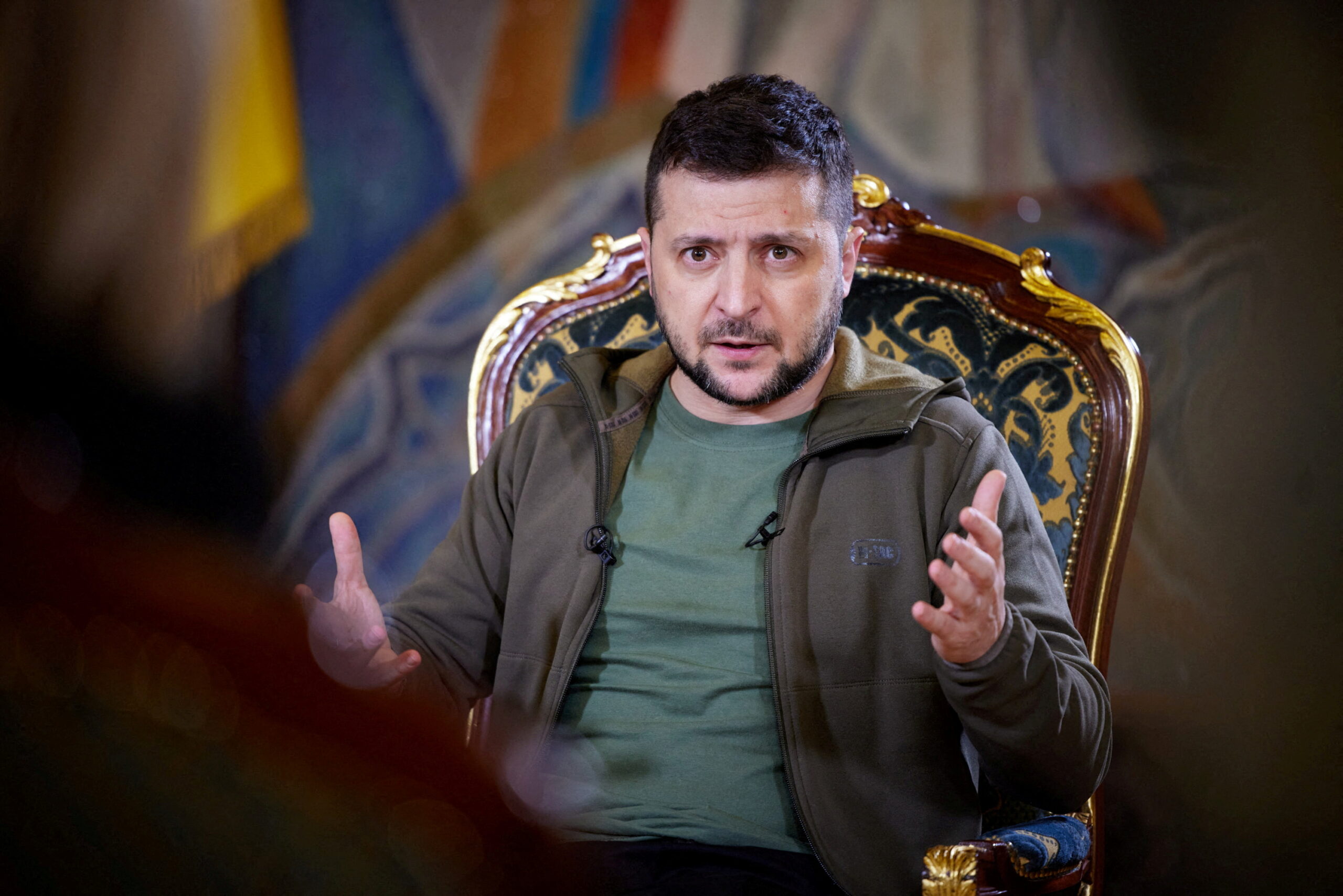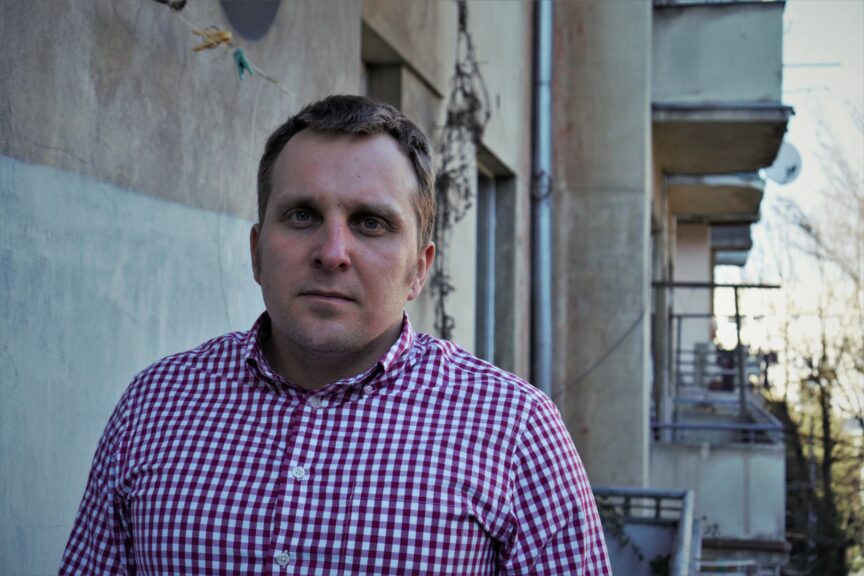Is Zelenskyy Cracking Down on the Ukrainian Left?
Some say the president’s decree is ‘concerning’.
by Volodya Vagner
24 March 2022

On 19 March, Ukrainian President Volodymyr Zelenskyy ratified a decision taken by the National Security and Defense Council of Ukraine to “temporarily suspend the activities” of 11 Ukrainian political parties, citing their alleged “links with Russia”. The decision applies to both electorally significant forces, like the Opposition Platform for Life (OPZZh), and a number of marginal parties, including several ostensibly leftist ones.
The response from Ukrainian leftists has been mixed. One of those to have weighed in is artist and publisher Dmytri Mrachnik, who represents the national-liberation tendency prevalent amongst Ukrainian anarchists and socialists, which favours militant struggle against Russian imperialism. Tweeting from the front lines, where he is serving in the Ukrainian army, he describes the affected parties as reactionary and collaborationist, and states that “martial law is a time of tough decisions”. In his view, the decree shouldn’t be construed as a blanket repression of the genuine Ukrainian left.
Germany-based Ukrainian sociologist Volodymyr Ishchenko, meanwhile, who has previously argued that Ukraine should negotiate an end to the fighting as soon as possible rather than aim for a decisive military victory at whatever human cost, has offered a more critical perspective. He believes the banned parties’ alleged Russian ties are overstated, given that many of them have come out against the invasion, and argues that the decree is a continuation of Zelenskyy’s push to consolidate his political power – a push that began before Russia’s recent invasion.
Earlier this week in Lviv, Novara Media met with Vitaliy Dudin – head of the Ukrainian democratic socialist organisation the Social Movement, which itself hopes to become a political party – to get his perspective on the decree.

Zelenskyy’s decree is concerning. We’re living through very difficult times, but restrictions on freedom of speech and association are only defensible when necessitated by compelling legal grounds. Even during a state of emergency, measures must be proportional to their aims. This presidential decree, however, does not fulfil its main stated aim – namely, ensuring Ukrainian security.
For Ukraine to win this war, two things will be needed: popular unity and international support. This ill-conceived decree risks jeopardising both. The most electorally significant parties affected by the decree – OPZZh and the party of blogger Anatoly Shariy – have certainly done a lot to divide Ukrainian society. If Ukrainian nationalists pull society in one direction, then the OPZZh and Shariy’s party pull in the other. Both promote the idea that Ukraine is under ultranationalist control, and that Russian-speaking populations are being oppressed. But the government now telling several million Ukrainians that the parties they voted for are beyond the pale likely won’t necessarily motivate them to keep fighting the invaders at the front either. And since the decree doesn’t exactly improve the country’s image, international support may be weakened, which could affect the supply of humanitarian aid and weapons to Ukraine.
I believe the government is trying to achieve both long-term goals, namely, weakening its competitors, and short-term goals, such as showing its readiness to pacify society at a time of war. While right now, the president is appealing to patriotic sentiments amongst Ukrainians – to those who are ready to fight to the end, or at least support the idea of armed resistance – we mustn’t forget that the political field is dynamic, and that any war ends with negotiations. Zelenskyy may be trying to prepare the ground for these negotiations and the conclusion of some kind of peace agreement with Russia. That is, his rhetoric may at some point need to take on a more peaceful tone, like that of the OPZZh, and he may then need the support of OPZZh’s traditional voters.
Indeed, the rationale behind this decree is political, based on unspecified accusations of anti-Ukrainianess on the part of these parties. It’s an unreasonable restriction on one of our most fundamental rights. This isn’t Russia, this is Ukraine, and our constitution proclaims a pluralist, multi-party system. We can’t just give up this essential component of our democracy under the pretext that we are at war.
Ukrainian legislation on political parties and martial law doesn’t include any clauses on the temporary suspension of the activities of political parties. Yes, the country is at war – but the law still demands that any such ban go through the courts. In fact, on top of the decreed temporary suspension, the government also tasked the Ministry of Justice with pursuing a permanent ban on these parties. This raises the question: why did the government not go via the courts to begin with?
I’m afraid that this trial may be rushed through before the end of martial law, and thus be held behind closed doors. If they get a fair trial, however, the parties’ lawyers will be able to present counter arguments, the Ministry of Justice will have to lay out its case, and the judge will have to consider the evidence, which takes time. Notably, the case against the Communist Party of Ukraine (CPU), which was banned in 2015, has been dragging on for years, despite the fact that decommunisation legislation made its banning much easier than is the case with these parties.
What all this means in practice isn’t quite clear yet. Until there is a court decision, these parties aren’t subject to dissolution, and their representatives in parliament should be able to remain there – though perhaps no longer under their parties’ names. But it’s clear that these parties face the threat of further repression, and in the future, others that criticise the government may too.
As leftists, of course, we are particularly concerned about restrictions on the left, and that the decree will create the perception that everything connected with the left and with socialism is part of some Russian strategy against Ukraine. At the same time, while many foreign comrades are currently asking us whether leftwing thought is now banned in Ukraine and if this is the start of a broader repression of the left, I don’t think it’s that categorical. Rather than an attack on the left per say, the government seems to have been guided by fairly vague ideas of what is ‘pro-Russian’ and ‘pro-Ukrainian’. You might say: no real leftists were harmed in the making of this decree. None of the targeted parties fight for social justice or for democratic socialism.
To explain: the ostensibly leftwing parties affected by the decree can be broken down into three categories. The first is those that have split from the Communist Party of Ukraine (CPU), which hasn’t contested elections for years after itself being banned. Here we have the State and Left Opposition, both of which promote undemocratic values, are fairly Stalinist, anti-LGBT, and focus on the cultural markers associated with the Slavic world’s struggle against the evil West.
The second is those that are essentially business projects, created to serve the interests of their leaders. Here we find the Union of Left Forces and the Socialists. While these parties include those with pro-Russian views, these are less pronounced. These are leader-centric parties, set up to support individual politicians ahead of elections rather than representing actual social constituencies.
The third group is where you find the Socialist Party of Ukraine (SPU) and the Progressive Socialist Party of Ukraine (PSPU) – once influential parties that are now shells of their former selves. In the 1990s, the SPU was the main pro-European centre-left force in Ukraine, but after a series of dirty games and party takeovers there is very little left of it. The PSPU was also an active party in the past, and was essentially a xenophobic version of the Communist Party in which Marxism was replaced with rhetoric about the need to protect Orthodox populations and Slavs and which held a strong anti-NATO position that bordered on hatred of the West.
In short, in spite of the restrictions now placed on these parties, those fighting for social justice in Ukraine will continue to do so. In that sense, things haven’t changed that significantly.
Volodya Vagner is a freelance journalist based in Sweden, covering culture and politics.


